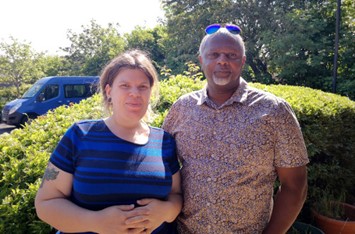Putting STOMP into practice
Some people living at one of Brandon’s registered care homes, near Bristol, came from long-stay institutionalised care. In these institutions they were often medicated in a way which they may – or, crucially, may not – have benefited from.
STOMP is a health campaign to stop the over-medication of people with learning disabilities and/or autism, and improve their quality of life.
Hugh and Sophie are team leaders at the care home – here they describe the life-changing effects STOMP can have…
The journey begins
 We first heard about the STOMP health campaign about three years ago, during a routine medication review for one of the people we support. The psychiatrist believed that the current medication would have no positive effects on the symptoms it was prescribed for and recommended changing to a more modern medicine. More reviews suggested others here might also benefit from the principles of STOMP.
We first heard about the STOMP health campaign about three years ago, during a routine medication review for one of the people we support. The psychiatrist believed that the current medication would have no positive effects on the symptoms it was prescribed for and recommended changing to a more modern medicine. More reviews suggested others here might also benefit from the principles of STOMP.
Initially, we had concerns about changing medications, given that the people we work with have behaviours which can sometimes challenge.
Of course, in theory, the STOMP principles made a lot of sense to us and was something we wanted to embrace as fully as possible – though admittedly there was an element of trepidation.
The process
Working closely with the psychiatrist was invaluable. We learned how the medicines work and were given estimated timeframes for expected changes in behaviour.
We made full use of STOMP resources including ABC charts (for recording and monitoring changes in behaviours and routines) and the audit tool which ensured we were doing everything we could in line with the campaign. This included scheduling regular reviews and monitoring use of ‘as required’ medication.
This was particularly important when feeding back to the medical professionals and helped ensure that we had an evidence base.
Listening to our staff team was central to the process. It was crucial for them to be able to voice any concerns – indeed, there were times when we felt like things weren’t working at all.
The results
The best part is seeing the outcomes. As the changes started to take effect, the people we support became more aware of the world around them.
So far, everyone we support seems to have benefited from the changes. One person has completed his medication change - he's far more engaged and communicative, and can focus better and for much longer. He also seems to enjoy himself rather than just take part in what’s happening.
 We’ve supported one person through the process of changing to a more suitable and effective medication. Another individual is in the process of moving towards a reduction of benzodiazepine (a psychoactive drug), and a third person has very recently started a reduction in anti-psychotic medication.
We’ve supported one person through the process of changing to a more suitable and effective medication. Another individual is in the process of moving towards a reduction of benzodiazepine (a psychoactive drug), and a third person has very recently started a reduction in anti-psychotic medication.
Partnership is key. We’ve worked closely with GPs, occupational therapists, and Brandon’s Positive Behaviour Support (PBS) team to find ways to best support people. We’ve also worked with occupational therapists to develop plans for increasing activity levels and interests, both at home and in the community.
In the past, the people we support have been prescribed medication to control behaviours which challenge, and PBS and STOMP have helped us move forward.
Where are we now?
We’re very proud of what we’ve achieved. Our team has worked tirelessly to support the individuals through their medication changes and the experience has shown us how well the staff know and care about the people we support. We plan to keep going – we’re committed to improving lives.
Most importantly, the lives of the people we support have improved greatly. Some of these improvements may seem small to the outside world but after decades of over-medication, it’s incredible to see their progress. Watching people engage with the world – and knowing we’ve been a part of making that happen – is a fantastic feeling.
Out-of-date thinking seems to allude to change being difficult, especially for people who have experienced institutional care. However, we’ve proved that although it may be hard work and challenging, it isn’t impossible – and it’s most definitely been worth it.
Sophie Young and Hugh Garnett
Team Leaders
Inspired?
Interested in working in a dedicated team? Find out about working at Brandon, and our current job vacancies, by visiting the jobs section.

